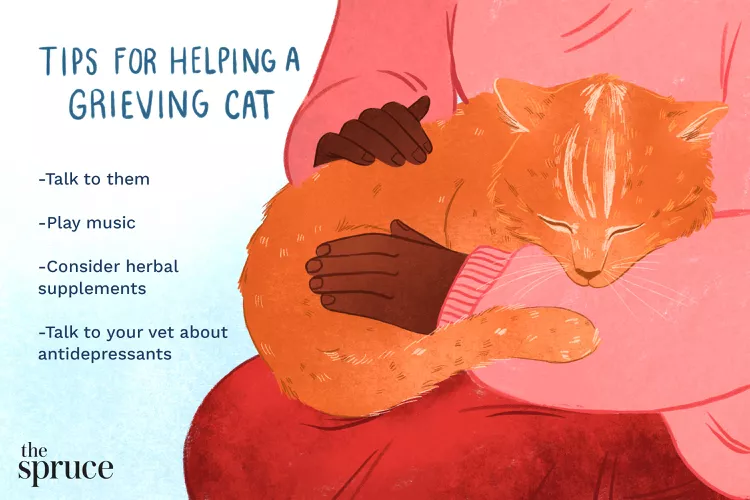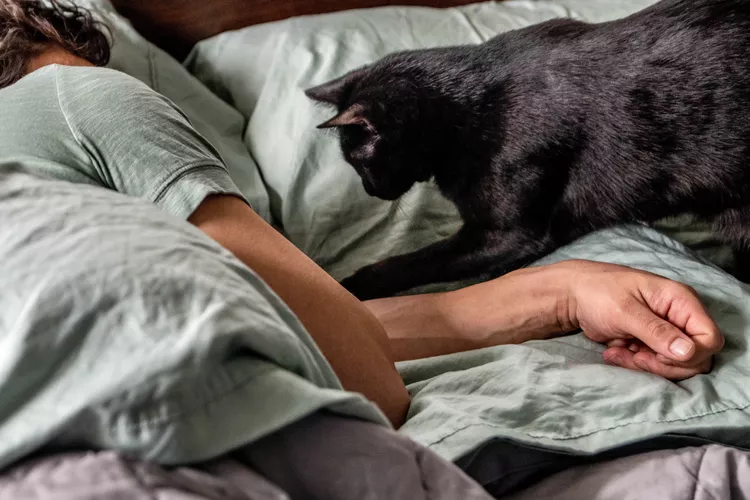Pet loss and grief can be difficult and heartbreaking for people, but it can be an even greater challenge to help the surviving pets deal with pet loss. Cats do, indeed, grieve.
They cannot tell us how they feel. And the owners in the family may overlook behavior changes while dealing with their own sense of loss. Not every pet will react at all, while a percentage seems to suffer greatly. When pets grieve, they usually show their sense of loss with behavior changes. In fact, separation anxiety is one form of grief—your cat only understands someone she loves is gone.
Pet Loss and Kitty Considerations
The surviving pets often begin to act differently when their companion cat or dog first becomes sick or starts to decline. For people, this can be a time of preparation, and some of our grieving may be done well in advance of the pet’s actual death. Dr. Barbara Kitchell, a veterinary cancer specialist, says that grief counseling often is part of what caring veterinarians naturally do.
We can’t know if surviving pets realize their companion animal friends will soon die, but they certainly do act as though aware a change has--or will--occur. In fact, many sensitive cats (and dogs) react to their owners’ emotional upset and grieve in response to our own changes of behavior over the heartache.
Pet Grief
The surviving pet may seem withdrawn and depressed. Often their personality changes and a shy cat could become more demanding of attention, while a demanding cat instead hides.
One of the most heartbreaking situations occurs when the surviving pet cries and looks everywhere for the missing loved one. This futile, heartbreaking search can go on for weeks.
Although it sounds macabre, sometimes it may be helpful to allow the surviving pet to say “goodbye” to the body after a furry friend has died. They may sniff and examine the body, cry or ignore it all together--and any reaction should be considered normal. That’s the only way we can explain to them what has happened to their friend, and why a beloved cat- or dog-friend has disappeared from their life. Viewing the friend's body allows them a chance to understand he's not coming back. They still grieve but hopefully aren't driven to look for their missing buddy.
Stages of Grief
People go through several stages of grief—denial, anger, bargaining, depression, acceptance—but not necessarily in this order. While anthropomorphic to think pets might “bargain” (I’ll let you have my catnip toy if only you come back!) it’s certainly within the realm of possibility that they might feel anger or depression over the loss. Pets do in fact seem to finally work through the situation to acceptance--it takes some pets much longer than others just as people get over a loss in different time frames.
Many of the same things we do for each other can help our pets. Dr. Wallace Sife, a psychologist, and author of “The Loss of a Pet” says to allow the grieving and even validate it with each other by simply offering compassion and support.
Helping Grieving Cats
How do you help your pets manage grief? Simply being with them for extra one-on-one time can help.
- Talk to them: Try to be positive around your grieving pets. They may not understand the words but will pick up on your emotions. Simply say, I’m sad, and I feel awful, but it’s not your fault--and I know you feel awful, too. You’ll want to avoid babying, though, because that can reward the pet for acting depressed.
- Play music, particularly uplifting, faster tempos to lift depression: Harp music can have a soothing effect. But any music that your pet associates with positive times could be helpful.
- Use antidepressants: The herb St. John’s Wort can as a natural antidepressant for some conditions in people. Since it can affect the excretion of other drugs and must be dosed according to body weight, consult your veterinarian for advice on its use. If the depression doesn’t lift and lasts too long, your veterinarian may be able to prescribe a stronger antidepressant drug.
Give your cat the gift of time to grieve. It hurts terribly--for you as well as your surviving pet. Still, the capacity to grieve honors the memory of the departed, and is a measure of the depth of our love. And that truly is a legacy to celebrate.

:strip_icc():format(webp)/GettyImages-876682416-5a5a9a9db39d0300371cc33e.jpg)



















